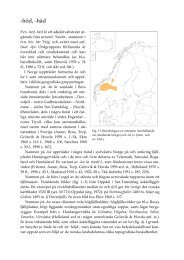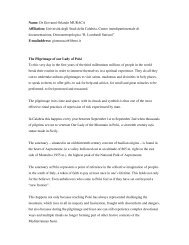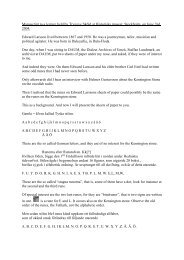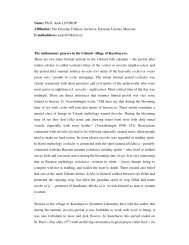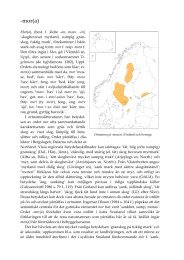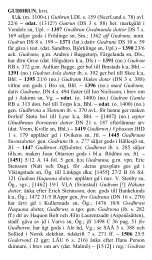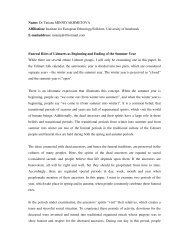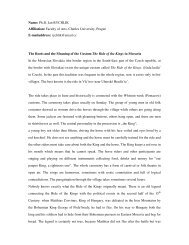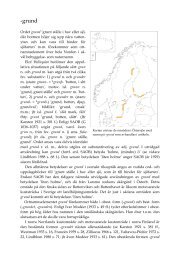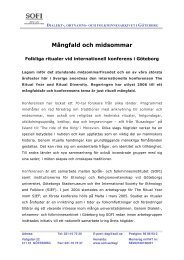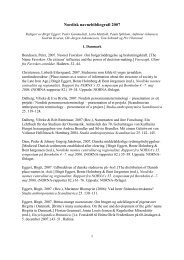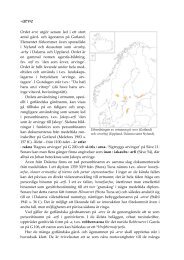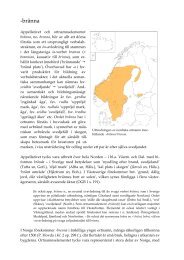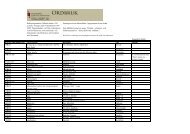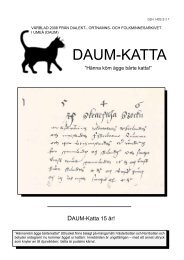NORNA-RAPPORTER 88 Binamn. Uppkomst, bildning, terminologi ...
NORNA-RAPPORTER 88 Binamn. Uppkomst, bildning, terminologi ...
NORNA-RAPPORTER 88 Binamn. Uppkomst, bildning, terminologi ...
You also want an ePaper? Increase the reach of your titles
YUMPU automatically turns print PDFs into web optimized ePapers that Google loves.
32 Bertie Neethling<br />
Names, however, cannot be ‘diminuated’ in this way, and this strengthens the<br />
argument that personal names deserve special treatment regarding word class<br />
status. Xhosa speakers, however, probably under the influence of English and/<br />
or Afrikaans, feel the desire to diminuate first names and then partly according<br />
to the same system applicable to Afrikaans and English, i.e. by using suffixes<br />
like -i, -ie, and -y. Landman (1986:167) refers to the tolerance regarding borrowing<br />
from English and Afrikaans nicknames. Xhosa appears to share the<br />
same kind of tolerance. Examples:<br />
Andile ‘they have increased’ > Andy Nombulelo ‘gratitude’ > Buli<br />
Sandisiwe ‘we have been added to’ > Sandy Nonkululeko ‘freedom’ ><br />
Nkuli<br />
Wandisile ‘he has been added’ > Wandy Solomzi ‘eye/guardian of the<br />
home’ > Solly<br />
Mpumelelo ‘success’ > Mpumi Zoliswa ‘one who calms’><br />
Zolie<br />
Noluthando ‘love’> Thandi Zukiswa ‘one to be praised’ ><br />
Zukie<br />
As with the shortened forms in categories 1 and 2 (above), the meaning is<br />
sacrificed in the shortened forms. The semivowel -y- [j] in the Xhosa names is<br />
now clearly the English suffix [i], hence borrowing it certainly is. The bynames<br />
ending on -ie also appear strange because vowels in Xhosa are never juxtaposed<br />
unless they are the same vowel, so this is probably due to influence from<br />
Afrikaans where -ie is a common diminutive suffix in common and proper<br />
nouns. In a multilingual country such as South Africa, this is not surprising.<br />
4. Affective diminuation (of surnames)<br />
This is a small category in the current data.<br />
Chetty > Chets<br />
Sayster > Says<br />
La Moer > Lammie<br />
Flowers > Blommie (blom = ‘flower’ in Afrikaans)<br />
Baatjes > Jackets (baadjies = ‘jackets’ in Afrikaans)<br />
In the last two examples, one can clearly see the interplay between Afrikaans<br />
and English through lexical transfer. Many of these students might be Afrikaans<br />
speaking at home but often also speak English with friends on and off<br />
campus.<br />
It appears as if emotivity plays a significant role in the so-called diminutive<br />
forms (and even in all the other typological formations of bynames). Respondents<br />
always remark that these bynames are used by those who love them, i.e.<br />
close relatives, intimate friends and loved ones. Semantic values such as affec-



